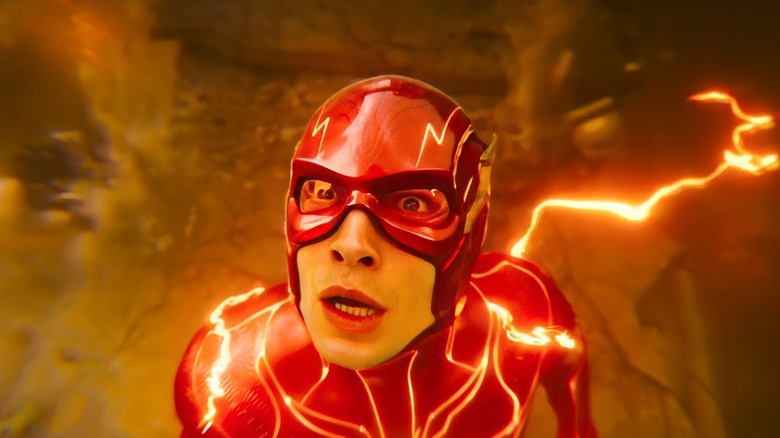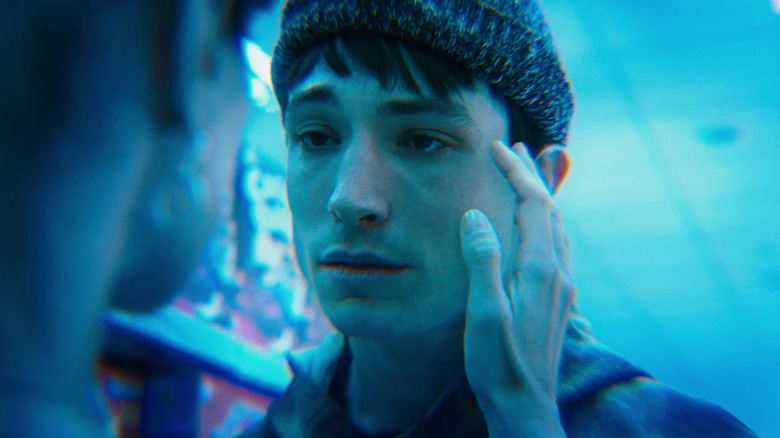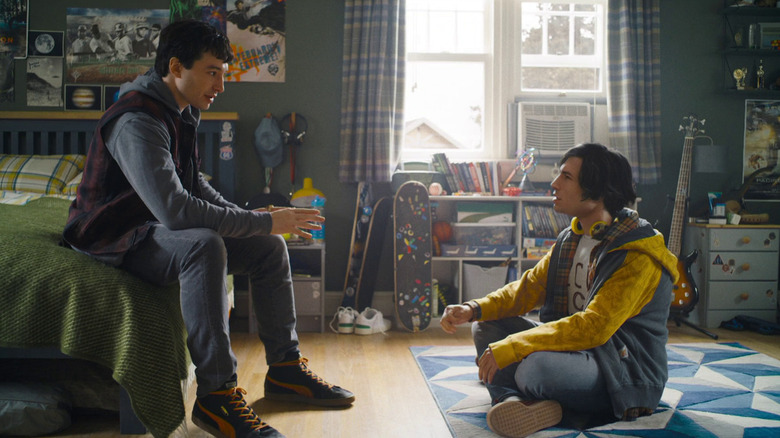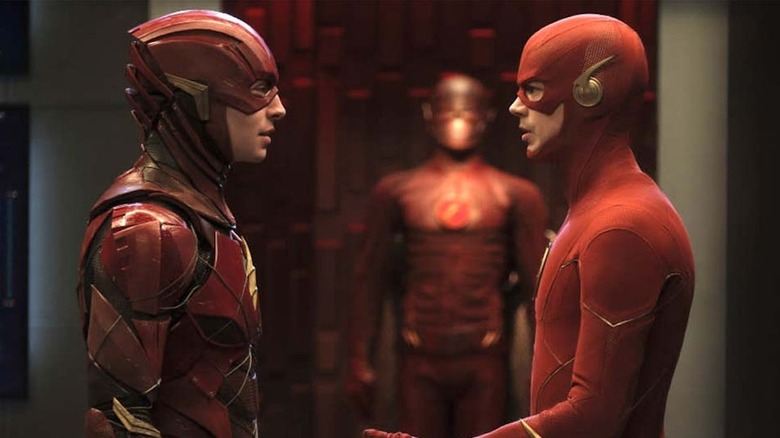Why The Flash Is Off To A Slow Start At The Box Office
There's a running gag in the DC universe about Barry Allen, aka The Flash: despite being the fastest man alive, he's always showing up late. This ironic character flaw presents itself in the opening sequence of "The Flash," the speedster's new solo movie, when he finds himself sneaking into work late after being waylaid by a sandwich, a collapsing hospital wing, and a baby in a microwave (among other extenuating circumstances).
"The Flash" itself is also running late. Originally planned for release in March 2018, the movie got trapped in the Phantom Zone, aka development hell, with a revolving door of writers and directors, and the cameras didn't start rolling until April 2021. In the time it's taken for the movie to come out, the DC Extended Universe has been rebranded as the DC Universe and DC Films has been rebranded as DC Studios, with new co-CEOs James Gunn and Peter Safran crafting a fresh slate of movies focusing on gods and monsters. The Justice League that Ezra Miller's Barry Allen was once a part of is drifting away: "The Flash" marks Ben Affleck's last planned appearance as Batman, there are no plans for "Wonder Woman 3," and "Aquaman and the Lost Kingdom" will be the final leftover from the DCEU days.
Perhaps that's why "The Flash" fell short of already low expectations at the box office in its opening weekend, grossing just $55 million in North America. The overseas totals are slightly higher, with Variety reporting a $75 million debut, but that's a pretty lackluster showing from a total of 78 international markets. So, what went wrong for this movie, and what does it mean for the character's future?
Barry misses the boat
Unlike the Marvel Cinematic Universe, which has suffered a recent downturn after years of box office domination, the DCU has had plenty of ups and downs. When you look at opening weekend numbers, "The Flash" is actually pretty much in the middle of the pack — roughly on par with the opening weekend for the first "Shazam!" movie. The stats are complicated, however, by the COVID-19 pandemic, which impacted the box office for most of the movies on the lower end of the chart. This makes it harder to look for a pattern, but it's safe to say that "The Flash" wasn't helped by releasing six years after the character's last big-screen appearance, and in the wake of a soft reboot for the DC franchise being announced.
Then there's the broader issue of "superhero fatigue," the long-portended saturation point where audiences have simply grown tired of superhero movies. The box office disappointments of "Black Adam," "Shazam! Fury of the Gods," and "Ant-Man and the Wasp: Quantumania" cemented superhero fatigue as a bona fide threat. However, the success of "Guardians of the Galaxy Vol. 3" (albeit still with a box office downturn from the previous entry) and the incredible box office numbers for "Spider-Man: Across the Spider-Verse" indicate that the superhero genre is far from dead; it's just that generic, formulaic stories aren't going to cut it any more. Whether it's the space opera weirdness of "Guardians" or the eye-popping animation of "Across the Spider-Verse," superhero movies now need to stand out.
"The Flash" feels like it's from an outdated playbook. The dead parent origin story is tired. Bringing back actors who played earlier versions of superheroes? It's hard to top "Spider-Man: No Way Home" on that front, and younger Batman fans grew up with Christian Bale, not Michael Keaton, as their Batman. And not only does "The Flash" have a dreaded third act sky beam — thanks to time travel shenanigans — it's the exact same sky beam we saw a decade ago in "Man of Steel."
The Ezra Miller factor
It's impossible to talk about "The Flash" without addressing the elephant/alleged cult leader in the room: star Ezra Miller. It's unlikely that a financially significant number of people actively boycotted "The Flash" over the allegations against Miller and their string of arrests, but the absence of a viable star can do just as much damage to a movie as an outright boycott. For years, Robert Downey Jr.'s charisma and star power helped drive the success of the MCU. "Spider-Man: Homecoming" used the bond between Downey's Iron Man and Tom Holland's Peter Parker as the launchpad for a successful new Spider-Man movie franchise, which is no mean feat considering the character had just been rebooted for the second time in the space of a decade. It's probably no coincidence that the MCU's box office downturn began after Downey exited the franchise in "Avengers: Endgame."
Miller did release an apology in August 2022, saying that they are "suffering complex mental health issues and have begun ongoing treatment" in order to "get back to a healthy, safe and productive stage in my life." However, they've been absent from press interviews in the lead-up to the release of "The Flash," only making their first public appearance at the Los Angeles premiere. Compare that to Dwayne Johnson, whose personal brand and commitment to promoting his movies undoubtedly saved "Black Adam" from being a far bigger disaster than it was.
The other Flash
TV often gets completely ignored in box office discussions, but it shouldn't be. 2006's "Superman Returns" failing to launch Brandon Routh's version of the Man of Steel may well have had something to do with "Smallville" being one of the biggest shows on TV, with the season 6 premiere drawing almost 5 million viewers later that same year. For a long time, Warner Bros. was concerned enough about TV shows diluting the appeal of its DC movies that certain characters were strictly off-limits for The CW's Arrowverse. When Joe Manganiello's version of Deathstroke joined the DCEU, Arrowverse showrunners were no longer allowed to feature Manu Bennett's version of the character.
With that in mind ... "The Flash" arrived in theaters less than a month after the CW's "Flash" series, which starred lovable boy next door Grant Gustin in the titular role, came to an end after nine seasons. Hardcore fans of the character weren't exactly starving for Flash content in the decade leading up to his solo movie. Miller's Barry Allen even made a cameo appearance during the Arrowverse's 2019/2020 "Crisis on Infinite Earths" crossover event. And while ratings certainly dipped towards the end of the series, the Arrowverse's Flash garnered a fanbase of millions around the world and mined the comics pretty thoroughly for storylines. It did the whole DC multiverse thing years before Miller's Flash met Keaton's Batman. Even if superhero fatigue isn't a thing, Flash fatigue might be.
With a budget north of $200 million, "The Flash" is unlikely to break even during its theatrical run. Short of some surprisingly strong legs at the box office in the coming weeks, don't bet on hearing any news about "The Flash 2." The DC Universe is setting out towards new horizons, and the Scarlet Speedster is likely to get left behind.



